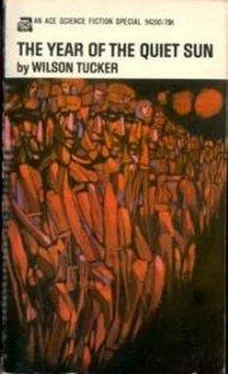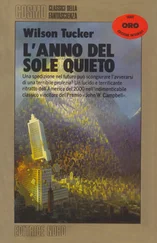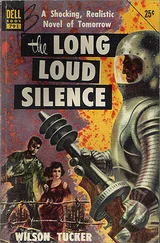Wilson Tucker - The Year of the Quiet Sun
Здесь есть возможность читать онлайн «Wilson Tucker - The Year of the Quiet Sun» весь текст электронной книги совершенно бесплатно (целиком полную версию без сокращений). В некоторых случаях можно слушать аудио, скачать через торрент в формате fb2 и присутствует краткое содержание. Год выпуска: 1970, ISBN: 1970, Издательство: Ace Books, Жанр: Фантастика и фэнтези, на английском языке. Описание произведения, (предисловие) а так же отзывы посетителей доступны на портале библиотеки ЛибКат.
- Название:The Year of the Quiet Sun
- Автор:
- Издательство:Ace Books
- Жанр:
- Год:1970
- ISBN:0-441-94201-6
- Рейтинг книги:3 / 5. Голосов: 1
-
Избранное:Добавить в избранное
- Отзывы:
-
Ваша оценка:
- 60
- 1
- 2
- 3
- 4
- 5
The Year of the Quiet Sun: краткое содержание, описание и аннотация
Предлагаем к чтению аннотацию, описание, краткое содержание или предисловие (зависит от того, что написал сам автор книги «The Year of the Quiet Sun»). Если вы не нашли необходимую информацию о книге — напишите в комментариях, мы постараемся отыскать её.
Won retrospective John W. Campbell Memorial Award in 1976.
Nominated for Nebula Award for Best Novel in 1970.
Nominated for Hugo Award for Best Novel in 1971.
The Year of the Quiet Sun — читать онлайн бесплатно полную книгу (весь текст) целиком
Ниже представлен текст книги, разбитый по страницам. Система сохранения места последней прочитанной страницы, позволяет с удобством читать онлайн бесплатно книгу «The Year of the Quiet Sun», без необходимости каждый раз заново искать на чём Вы остановились. Поставьте закладку, и сможете в любой момент перейти на страницу, на которой закончили чтение.
Интервал:
Закладка:
When the sun was quiet again, the man who was two men worked to refill the well (cistern) and he swept the skies clear of debris. The dragons fled from their foul nests, and the plague fled with them to another part of the world. The man turned his eye up to the Temple and there was a great, blinding yellow light filling the heavens from the rim of the world to the rim: and it was a sign and a promise from the holy prophets to the laborer that the world was made new again, and was at peace with itself. Flowers bloomed and there was fruit on the vine. The sun was quiet.
The man who was two men rested in his earth-place (tomb?) and was content.
Brian Chaney pulled himself from his reverie to look down the table at his companions.
Arthur Saltus was reading the photo-copied pages in a desultory manner, his interest barely caught by the narrative. Major Moresby was scribbling in a notebook — his only support to a retentive memory — and had gone back to the beginning of the translation to read it a second time. Chaney suspected he was hooked. Kathryn van Hise was across the table from him, sitting motionless with her fingers interlaced on the tabletop. The young woman had been surreptitiously watching him while he day-dreamed, but turned her glance down when he looked directly at her.
Chaney wondered what she really thought of all this? Apart from her superior’s opinions, apart from the stance officially adopted by the Bureau, what did she think? At breakfast she had exhibited some embarrassment — it may have been alarm — at the prospect of filming the alternate target, filming the Crucifixion, but other than that he’d found no sign of her personal beliefs or attitudes toward the future survey. She had revealed pride and triumph in the engineers’ accomplishments and she was fanatically loyal to her employer — but what did she think? Did she have any mental reservations?
He failed utterly to understand Seabrooke’s interest in the second scroll.
Every scholar recognized it as midrash ; there had been no controversy over the second scroll and had it been published alone he would have escaped the notoriety. He thought Gilbert Seabrooke something of a lunatic to even introduce it into the briefing room. There was no meat here for the survey. There was nothing in the Eschatos relating to the coming probe of the turn of the century; the story was firmly rooted in the first century before Christ and did not look or hint beyond 70 A.D. Actually it didn’t peer beyond its own century. It made no claim or pretense to genuine prophecy as did, say, the Book of Daniel — whose scribe pretended to be alive about five hundred years before he was born, only to betray himself by his faulty grasp of history. Gilbert Seabrooke was reading imaginary lines between the lines, grabbing at rays of yellow light and the droppings of dragons.
One of the three telephones rang.
Kathryn van Hise jumped from her chair to answer and the three men turned to watch her.
The conversation was short. She listened carefully, said Yes, sir three or four times, and assured the caller that the studies were proceeding at a satisfactory pace. She said Yes, sir a final time and hung up the instrument. Moresby was half out of his chair in anticipation.
Saltus said: “Well, come on , Katrina!”
“The engineers have concluded their testing and the vehicle is now on operational status. Field trials will begin very soon, gentlemen. Mr. Seabrooke suggested that we take the day off as a token of celebration. He will meet us at the pool this afternoon.”
Arthur Saltus yelled, and was halfway to the door.
Brian Chaney dropped his copy of the Eschatos scroll into a wastebasket and prepared to follow him.
He looked to the woman and said: “Last one in is a wandering Egyptian.”
SIX
Brian Chaney came up from a shallow dive and paddled to the edge of the pool; he clung to the tiled rim for a space and attempted to wipe the gentle sting of chlorine from his eyes. The sun was hot, and the air warmer than the water. Two of his companions played in the water behind him while a third — the Major — sat in the shade and stared solemnly at a chess board, waiting for anyone to come along and challenge him. The pieces were set out. The recreation area held a few others beside themselves but none seemed interested in chess.
Chaney glanced over his shoulder at the pair playing in the water, and felt the smallest pain of jealousy. He climbed from the pool and reached for a towel.
Gilbert Seabrooke said: “Afternoon, Chaney.”
The Director of Operations sat nearby under a gaudy beach umbrella, sipping a drink and watching the bathers. It was his first appearance.
Chaney stretched the towel over his back and ran across the hot tiles. “Good afternoon. You’re the red telephone.” They shook hands.
Seabrooke smiled briefly. “No; that’s our line to the White House. Please don’t pick it up and call the President.” A wave of the hand extended an invitation to the other chair beneath the umbrella. “Refreshments?”
“Not just yet, thanks.” He studied the man with an open curiosity. “Has someone been carrying tales?” His glance went briefly to the woman in the water.
Seabrooke’s smooth reply attempted to erase the sting. “I receive daily reports, of course; I try to keep on top of every activity on this station. And I’m quite used to people misunderstanding my motives and actions.” Again the smallest of stingy smiles. “I make it a practice to explore every possible avenue to attain whatever goal is in view. Please don’t be upset by my interest in your outside activities.”
“They have no relation to this activity.”
“Perhaps, and perhaps not. But I refuse to ignore them for I am a methodical man.”
Chaney said: “And a persistent one.”
Gilbert Seabrooke was tall, thin, taut, and looked like that well-known fellow in the State Department — or perhaps it was that other fellow who sat on the Supreme Court. He wore the carefully cultivated statesman image. His hair was silver gray and parted precisely in the middle, with the ends brushed backward at a conservative angle; his eyes appeared gray, although upon closer inspection they were an icy blue-green; the lips were firm, not used to laughter, while the chin was strong and clean with no hint of a double on the neckline. He carried his body as rigidly erect as a military man, and his pipe jutted out straight to challenge the world. He was Establishment.
Chaney had vague knowledge of his political history.
Seabrooke had been governor of one of the Dakotas — memory refused to reveal which one — and was only narrowly defeated in his bid for a third term. The man quickly turned up in Washington after the defeat and was appointed to a post in Agriculture: his party took care of its faithful. Some years later he moved to another post in Commerce, and after several years he dropped into a policy-making office in the Bureau of Standards. Today he sat beside the pool, directing everything on station.
Chaney asked: “How’s the battle going?”
“Which battle?”
“The one with the Senate subcommittee. I suspect they’re counting the dollars and the minutes.”
The tight lips quavered, almost permitting a smile. “Eternal vigilance results in a healthy exchequer, Chaney. But I am having some little difficulty with those people. Science tends to frighten those who are infrequently exposed to it, while the practitioners of science are often the most misunderstood people in the world. The project could be different if more imagination were brought into play. If our researches were directly connected to the hostilities in Asia, if they would result in practical military hardware, we would be drowning in funds.” A gesture of discontent. “But we must fight for every dollar. The military people and their war command priority.”
Читать дальшеИнтервал:
Закладка:
Похожие книги на «The Year of the Quiet Sun»
Представляем Вашему вниманию похожие книги на «The Year of the Quiet Sun» списком для выбора. Мы отобрали схожую по названию и смыслу литературу в надежде предоставить читателям больше вариантов отыскать новые, интересные, ещё непрочитанные произведения.
Обсуждение, отзывы о книге «The Year of the Quiet Sun» и просто собственные мнения читателей. Оставьте ваши комментарии, напишите, что Вы думаете о произведении, его смысле или главных героях. Укажите что конкретно понравилось, а что нет, и почему Вы так считаете.












